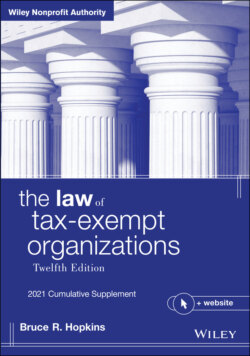Читать книгу The Law of Tax-Exempt Organizations, 2021 Cumulative Supplement - Bruce Hopkins R., Bruce R. Hopkins, David Middlebrook - Страница 17
ОглавлениеCHAPTER SIX Concept of Charitable
§ 6.2 Public Policy Doctrine (b) Race‐Based Discrimination
§ 6.3 Collateral Concepts (a) Requirement of Charitable Class (i) Illegal Activities
§ 6.2 PUBLIC POLICY DOCTRINE
(b) Race‐Based Discrimination
p. 118, third paragraph, fourth sentence. Delete and substitute:
This policy must be publicized by the school to all segments of the general community served by the school, by notice in a newspaper, use of broadcast media, or (pursuant to guidelines issued in 2019)69.1 display of a notice on its primary publicly accessible Internet homepage in a manner reasonably expected to be noticed by visitors to the homepage.
p. 119, fourth line. Move footnote to follow guidelines.
p. 119, note 72. Insert before last period:
, as modified by Rev. Proc. 2019‐22, 2019‐22 I.R.B. 1260.
§ 6.3 COLLATERAL CONCEPTS
(a) Requirement of Charitable Class
p. 126, last complete paragraph. Insert as last sentence:
Yet, somewhat inexplicably, the IRS ruled that a resident advisory council with respect to a retirement community must have its tax exemption revoked because it is operating for the private interests of its members, portrayed as a “private class of residents,” and not functioning in ways that are “beneficial to the general public as a whole.”143.1
(i) Illegal Activities
p. 135, note 213. Insert following existing text:
The IRS determined that an organization could not be exempt because it engaged in illegal activities, which apparently were activities to obstruct administration of the revenue laws, as detailed in a plea agreement entered into by its executive director (Priv. Ltr. Rul. 201924018).
p. 135, last paragraph. Insert as last sentences:
The IRS thus denied recognition of exemption in a case involving an organization that had as its mission provision of a way for its members to collectively and cooperatively cultivate and distribute marijuana for medical purposes to qualified patients and primary caregivers who came together to cultivate physician‐recommended marijuana.217.1 The IRS adopted a similar stance in denying recognition of exemption to a nonprofit organization providing financial assistance to patients in need who are adversely affected by the costs of medical treatments using cannabis‐based compounds217.2 and to a nonprofit organization with a program of fundraising and dissemination of funds to patients in a state program who had been approved to receive medical marijuana in the state.217.3
Notes
1 69.1 Rev. Proc. 2019‐22, 2019‐22 I.R.B. 1260.
2 143.1 Priv. Ltr. Rul. 201911016.
3 217.1 Priv. Ltr. Rul. 201615018.
4 217.2 Priv. Ltr. Rul. 201917008.
5 217.3 Priv. Ltr. Rul. 201940008. See § 25.5(c).
